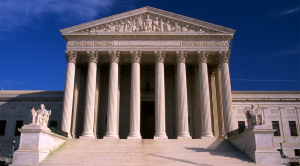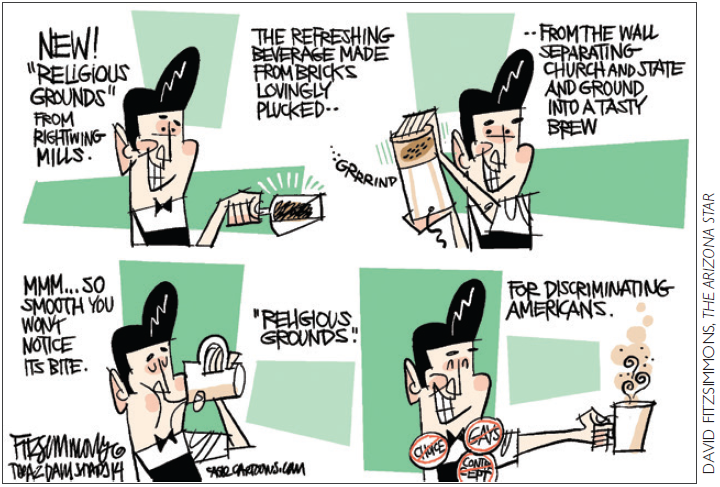The Real Hobby Lobby Problem

Line up your rotten tomatoes to throw at me. If I were on the Supreme Court, I’d hold my nose and vote to allow Hobby Lobby to be exempt from the Obamacare mandate that health insurance plans must provide coverage for all types of contraceptives, including the so-called “morning after” pill.
I wouldn’t vote that way because I think that mandatory contraceptive coverage in health plans is a bad idea. I would vote that way because judges are supposed to interpret the law as it stands, not make policy according to their own personal preferences. And the law as it stands includes my nominee for the single worst statute on the books today, the Religious Freedom Restoration Act of 1993 (RFRA), which is the shield Hobby Lobby is hiding behind.
The very title of this law raises an eyebrow. What was being restored? Haven’t we always had religious freedom? Especially in 1993, at the peak of Jerry Falwell’s Moral Majority? In fact we did, but that did not deter politicians from playing games. Democrats, then as now, envied the power of the religious right, and then as now deluded themselves into thinking they could win over a fair share of evangelical voters by sucking up to organized religion.
A 1990 Supreme Court case called Employment Division v. Smith gave them the opportunity they sought. Two employees at an Oregon drug rehab clinic, of all places, decided to experiment with illegal drugs. They were caught and fired, then they applied for unemployment benefits. The agency turned them down, because of a straightforward rule against using the state’s limited unemployment funds for persons who lost their jobs because of their own criminal activity. “Ah,” seemed to say the ex-employees, “but we’re different. We used the drug in a ‘religious’ ceremony. So the rules that apply to everyone else shouldn’t apply to us, because God experts should get special treatment.”
The Court decided that no, they shouldn’t get special treatment. Freedom of religion meant that a particular set of religious beliefs couldn’t be singled out for harsh treatment, but it did not mean that government was prevented from enforcing a religiously neutral law that applies to everyone equally, like a speed limit, or a law against using hallucinogenic drugs. (Or, one might add today, a mandate that healthcare plans must include contraceptive coverage.)
 To hear the howl that went up from the religious right, you’d think that Stalin and Mao had taken over the U.S. government and we were facing “The End Of Religion As We Know It.” So shortly after the Democrats took control of the White House in 1993, Democratic Senator Ted Kennedy teamed with Republican Senator Orrin Hatch to ram through one of the most breathtakingly awful statutes in our nation’s history in order to reverse the effect of this case. RFRA, to put it bluntly, invalidated every federal, state, and local law in the country as it applied to anything claiming to be a practice of religion, unless the government could demonstrate a “compelling interest” in its enforcement. For example, it would (probably) be okay for a government to enforce murder laws against the religious practice of human sacrifice. But if the world isn’t going to come crashing down because a couple of government employees get high in their spare time, then they can blithely ignore the laws that apply to everyone else by claiming that they are communing with God.
To hear the howl that went up from the religious right, you’d think that Stalin and Mao had taken over the U.S. government and we were facing “The End Of Religion As We Know It.” So shortly after the Democrats took control of the White House in 1993, Democratic Senator Ted Kennedy teamed with Republican Senator Orrin Hatch to ram through one of the most breathtakingly awful statutes in our nation’s history in order to reverse the effect of this case. RFRA, to put it bluntly, invalidated every federal, state, and local law in the country as it applied to anything claiming to be a practice of religion, unless the government could demonstrate a “compelling interest” in its enforcement. For example, it would (probably) be okay for a government to enforce murder laws against the religious practice of human sacrifice. But if the world isn’t going to come crashing down because a couple of government employees get high in their spare time, then they can blithely ignore the laws that apply to everyone else by claiming that they are communing with God.
RFRA sailed through the Congress with virtually no debate and no opposition. With both Kennedy and Hatch assuring their parties that ingratiating God experts was politically clever, no member of Congress paid the slightest attention to whether there was any real loss of religious freedom that needed to be restored, or what the impact of such an extraordinarily broad law might be.
Now we know. Whole books have been written about lunacy resulting from RFRA (and at least one more will address it, if I ever finish it). It will certainly have a chapter on Hobby Lobby, quoting from what will be a 5-4 Supreme Court decision to the effect that RFRA trumps this part of Obamacare, because RFRA gives people who claim sincere religious beliefs special privileges over the rest of us.
“Ah,” our feminist leaders are doing their best to say, “but in fact there is a ‘compelling interest’ in making contraceptives available to women.” True enough, but the Obamacare masterminds shot themselves in the foot on this one, by allowing so many other exemptions to the “mandate” that it isn’t really a mandate at all. Churches? Exempt. Religious nonprofit organizations, like parochial schools? Exempt. “Grandfathered” Christian healthcare scams, like I wrote about last week? Exempt. If Congress and rule-writers really saw a “compelling interest” in making contraceptives available to women, why would they have exempted approximately a third of America’s employees from the mandate? The interest is only compelling for two-thirds? The government is arguing that it’s okay for some types of God experts to ignore the contraceptive coverage rule, but not for others—exactly the kind of picking and choosing that Jefferson dreamt the “wall of separation” would eliminate.
The solution, both for those (including me) who think that all women should have ready access to contraceptives and for those (including me) who resent special privileges for God experts, is simple: Repeal RFRA. Have one government, with one set of laws that applies equally to everybody, regardless of what they do or don’t believe about the supernatural. How difficult is that?
